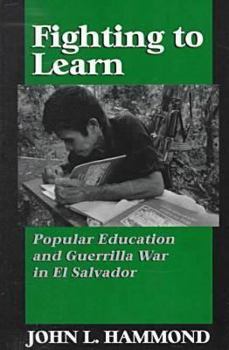Fighting to Learn: Popular Education and Guerilla War in El Salvador
Select Format
Select Condition 
Book Overview
Popular education played a vital role in the twelve-year guerrilla war against the Salvadoran government. Fighting to Learn is a study of its pedagogy and politics. Inspired by Paulo Freire's literacy work in Brazil in the 1950s, popular education brought literacy to poor rural communities abandoned by the official education system and to peasant combatants in the guerrilla army. Those who had little education taught those who had none. Popular education taught people skills, raised the morale that sustained them in unequal combat, and stimulated the creation of an organizational network to hold them together. Hammond interviewed more than 100 Salvadoran students and teachers for this book. He recounts their experiences in their own words, vividly conveying how they coped with the hardships of war and organized civilian communities politically to support a guerrilla insurgency. Fighting to Learn tells how poorly educated peasants overcame their sense of inferiority to discover that they could teach each other and work together in a common struggle. First examining the Christian base communities through which popular education came to El Salvador, Hammond then discusses how guerrilla combatants, political prisoners, and refugees learned. He shows that education was both a pedagogical and a political practice: he discusses the training of completely inexperienced teachers, the linking of basic literacy skills with politics, and the organizing of communities. Fighting to Learn offers both a detailed account of an historical moment and a broad theoretical discussion of the relationship between education, community organizing, and the political process.
Format:Paperback
Language:English
ISBN:0813525268
ISBN13:9780813525266
Release Date:May 1998
Publisher:Rutgers University Press
Length:253 Pages
Weight:0.95 lbs.
Dimensions:0.6" x 5.5" x 8.5"
Customer Reviews
1 rating
The future of education and healthcare may look like this...
Published by Thriftbooks.com User , 25 years ago
This book is an inspired, readable, and labor of love account of the growth of popular education in El Salvador. The writer shares the continuing challenges faced and rewards shared by students, teachers, and those who teach the teachers. As in El Salvador, the US, especially Texas, California, Florida, New Mexico, Arizona will increasingly face similar challenges. With the growth of the Spanish speaking populations in the U.S. over the next twenty years, educators and health care professionals will be challenged to adapt and at times abandon certain professional roles and attitudes, in favor of more indigenous methods and messengers for advancing literacy and promoting life enhancing health practices and interventions. Public policy in Texas is already shifting toward the use of community based practitioners in healthcare with a view toward building social capital in Hispanic cultures that can become self-sustaining. Professional treatment and education models are not abandoned, but new program growth may be toward the use of professionals to teach the teachers, health educators, and care givers to care for their own communities, and build community based, rather than, state driven programs. Social service professionals in the U.S. may see their future in this book.





